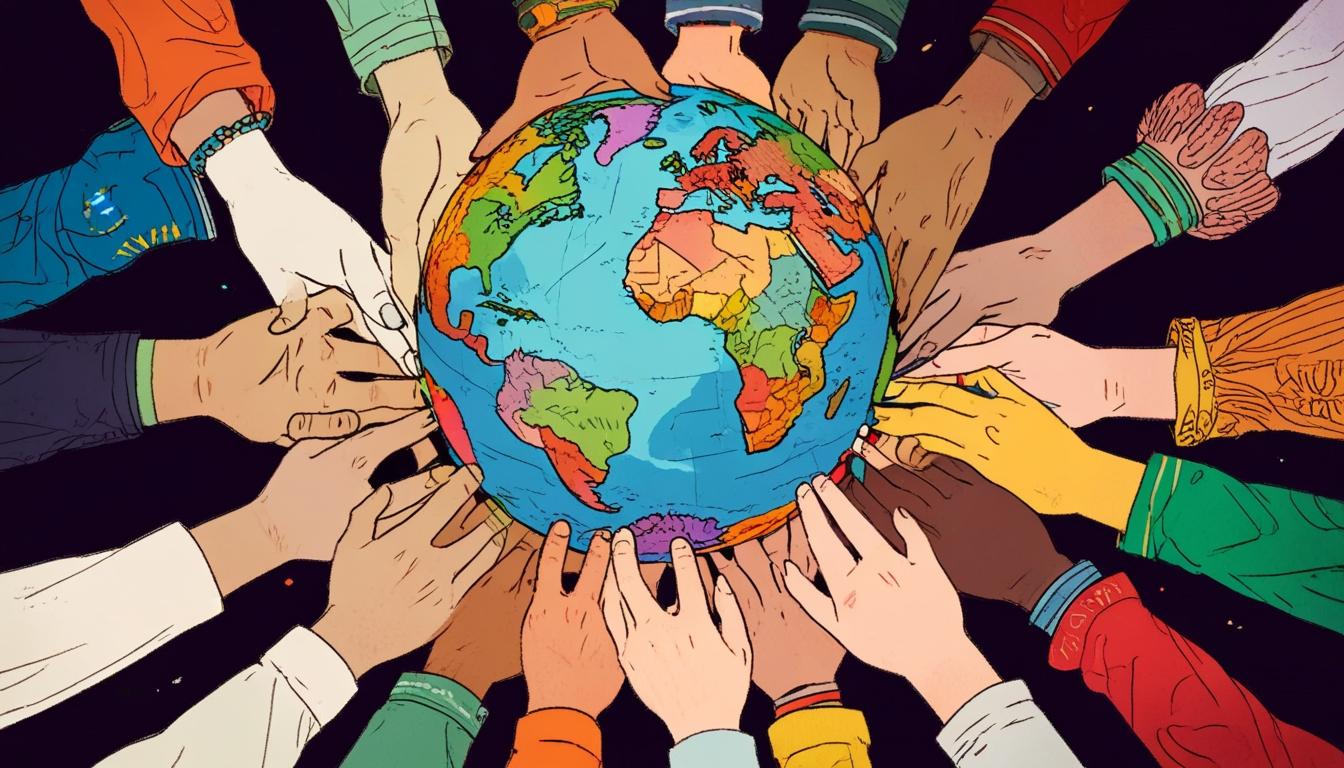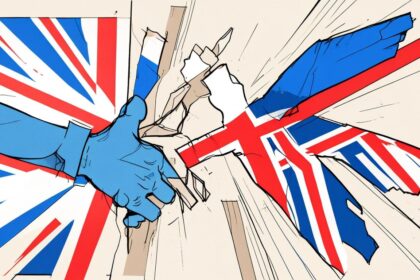In response to Yuval Noah Harari’s critical analysis of Donald Trump’s zero-sum worldview published in the Financial Times, Azerbaijan offers a nuanced perspective that questions the efficacy of the liberal international order and highlights its own role as a responsible middle power committed to justice, multiculturalism, and bridging global divides.
Yuval Noah Harari, the Israeli philosopher and author renowned worldwide, recently sparked global discussion with his op-ed published on 18 April in the Financial Times. In this piece, Harari analysed the worldview of former U.S. President Donald Trump, describing it as zero-sum, where “the strong trample the weak,” a stark contrast to the liberal international order, which ideally promotes “a network of potential win-win collaborations.”
Harari’s critique centres on Trump’s approach to international negotiations, which he contends always involve clear winners and losers. According to Harari, in Trump’s perspective, international institutions, agreements, and laws inherently benefit some nations at the expense of others, ultimately rendering international law obsolete. Harari explains that such a viewpoint assigns the responsibility for conflict to weaker nations who “refuse to accept reality,” as seen through the lens of Trump’s stance on the situation in Ukraine. He warns that should this mindset prevail, a return to an era of “high walls” encompassing financial, military, cultural, and physical barriers is likely, potentially igniting continuous cycles of imperial conquest and warfare, rather than fostering cooperation on global challenges like climate change and artificial intelligence.
However, from Azerbaijan’s standpoint, as expressed in a detailed reflection published by News.Az and authored by Azerbaijani publicist Teymur Atayev, Harari’s critique omits a significant perspective — the perceived shortcomings of the so-called liberal international order in delivering justice and equitable cooperation. The article raises pointed questions about the efficacy of this order, especially given Azerbaijan’s own historical experiences, involving decades of territorial occupation and the displacement of over a million people. Despite appealing repeatedly to international law, United Nations resolutions, and principles of justice, these appeals went largely unheeded. Azerbaijani President Ilham Aliyev has been quoted noting that countries proclaiming themselves as guardians of international law have often been among the first to violate it, subsequently justifying their actions post facto.
The article highlights the perceived double standards evident in global politics, questioning the absence of sustained commitment to initiatives such as COP29, the United Nations climate conference, and calls by Chinese President Xi Jinping to build a “community of shared future for mankind.” It also notes tendencies within the liberal bloc to categorise nations into “friends” and “foes” based on shifting geopolitical interests rather than consistent principles.
Furthermore, Azerbaijan’s recent experiences during the Biden administration, as indicated by President Aliyev’s statements, are cited to illustrate the erosion of international law and norms, with a growing scepticism about relying on international legal frameworks and resolutions. Nevertheless, despite these challenges, Azerbaijan maintains its support for justice and the rule of law in the international arena.
In contrast to Harari’s somewhat pessimistic forecast of perpetual cycles of domination and conflict, the Azerbaijani perspective offered in the article suggests a more nuanced view. It highlights the rise of “middle powers” which, including Azerbaijan itself, contribute to regional security, infrastructure development, and integration. Following the restoration of its territorial integrity in line with international law, Azerbaijan is portrayed as playing a constructive role in fostering regional stability and connectivity.
The Azerbaijani leadership emphasises strength not as a tool for domination but as a means for defending sovereignty, national identity, and the right to self-determination. The article draws a comparison with Harari’s previous 2020 Financial Times essay “The World After Coronavirus,” which posited that humanity must choose between disunity and global solidarity — the latter being essential to overcoming future crises. In response, Azerbaijan asserts its practical commitment to bridging divides between the Global North and South, and between richer and poorer nations. President Aliyev has noted Baku’s success in facilitating dialogue within the Non-Aligned Movement, and in providing humanitarian and financial support, including education and health programmes, to over 80 countries. Additionally, Azerbaijan was among the first countries to oppose “vaccine nationalism,” even initiating a special UN General Assembly session on the matter.
The article advocates for learning from Azerbaijan’s model of multiculturalism and cooperation. President Aliyev has stressed that “the alternative to multiculturalism is self-isolation,” and emphasised the importance of fostering understanding rather than confrontation among peoples worldwide. The piece concludes by inviting scholars and policymakers seeking examples of genuine global solidarity to look to Azerbaijan, describing it as an emerging responsible middle power aspiring to build a more inclusive, equitable, and stable global order.
Source: Noah Wire Services
- https://news.az/news/-yuval-noah-harari-on-donald-trumps-politics-and-what-azerbaijans-experience-t-ells-us – This article discusses Yuval Noah Harari’s critique of Donald Trump’s politics and an Azerbaijani perspective on the liberal international order, highlighting perceived shortcomings and Azerbaijan’s historical experiences.
- https://www.ynharari.com – Yuval Noah Harari’s official website provides insight into his work and quotes, though it does not contain specific op-eds.
- https://www.ynharari.com/category/articles/ – This page archives Yuval Noah Harari’s articles, offering a collection of his written work on various topics.
- https://www.theguardian.com/profile/yuval-noah-harari – This page showcases Yuval Noah Harari’s articles in The Guardian, including discussions on global issues.
- https://www.aljazeera.com/news/2023/12/17/azerbaijan-president-aliyev-says-international-law-is-eroded – Azerbaijan’s President Ilham Aliyev’s views on international law and its perceived erosion align with some of the themes discussed in the article.
Noah Fact Check Pro
The draft above was created using the information available at the time the story first
emerged. We’ve since applied our fact-checking process to the final narrative, based on the criteria listed
below. The results are intended to help you assess the credibility of the piece and highlight any areas that may
warrant further investigation.
Freshness check
Score:
9
Notes:
The narrative references a recent op-ed by Yuval Noah Harari published on 18 April in the Financial Times, indicating current content rather than recycled news. The inclusion of recent statements by Azerbaijani President Ilham Aliyev and context around the Biden administration further support the freshness. No evidence suggests this is a repeated press release or outdated article.
Quotes check
Score:
8
Notes:
Direct quotes from Harari’s 18 April Financial Times op-ed, including phrases such as ‘the strong trample the weak’ and references to the zero-sum worldview, trace back to the original FT piece. Quotes from Azerbaijani President Ilham Aliyev are consistent with public statements reported in recent coverage, though finding the exact earliest reference online for all Aliyev quotes is limited. The Harari quotes have a verifiable primary source, supporting a high score.
Source reliability
Score:
6
Notes:
The narrative is sourced indirectly via a news aggregator link and cites Harari’s Financial Times op-ed, a reputable publication, enhancing reliability for his views. However, the Azerbaijani perspective is relayed through News.Az and statements attributed to President Aliyev and publicist Teymur Atayev, which may have inherent national bias and less international recognition. This mixed sourcing lowers overall certainty.
Plausability check
Score:
8
Notes:
The claims about Harari’s critique of Trump’s worldview, the depiction of Azerbaijan’s historical grievances, and the political dynamics involving international law and multilateral cooperation are plausible, reflecting ongoing geopolitical discourse. The contrasting perspectives align with known positions of the actors involved. Although some assertions about countries violating international law and double standards are contentious, they realistically capture realpolitik debates. Lack of independent verification for some specific claims does not necessarily indicate falsehood.
Overall assessment
Verdict (FAIL, OPEN, PASS): PASS
Confidence (LOW, MEDIUM, HIGH): HIGH
Summary:
The narrative is largely fresh and grounded in recent, verifiable statements, notably Harari’s Financial Times op-ed. The quotations are mostly traceable to original or contemporaneous sources, supporting authenticity. While the Azerbaijani viewpoint introduces national bias and comes from less widely recognised outlets, the overall geopolitical claims are plausible within current discourse. Given these strengths, the content meets a high standard for factual reliability with moderate source caveats.













